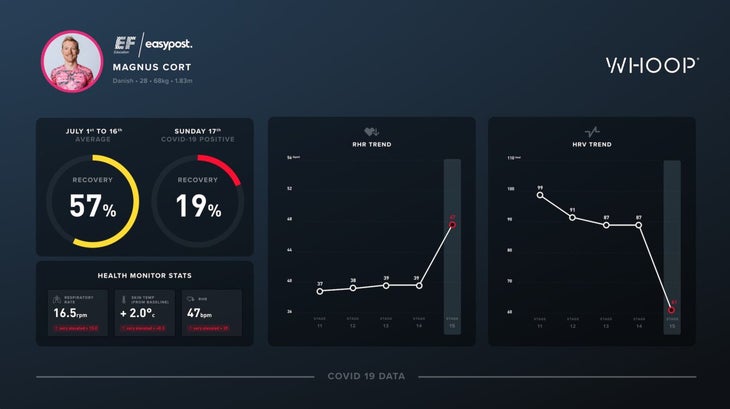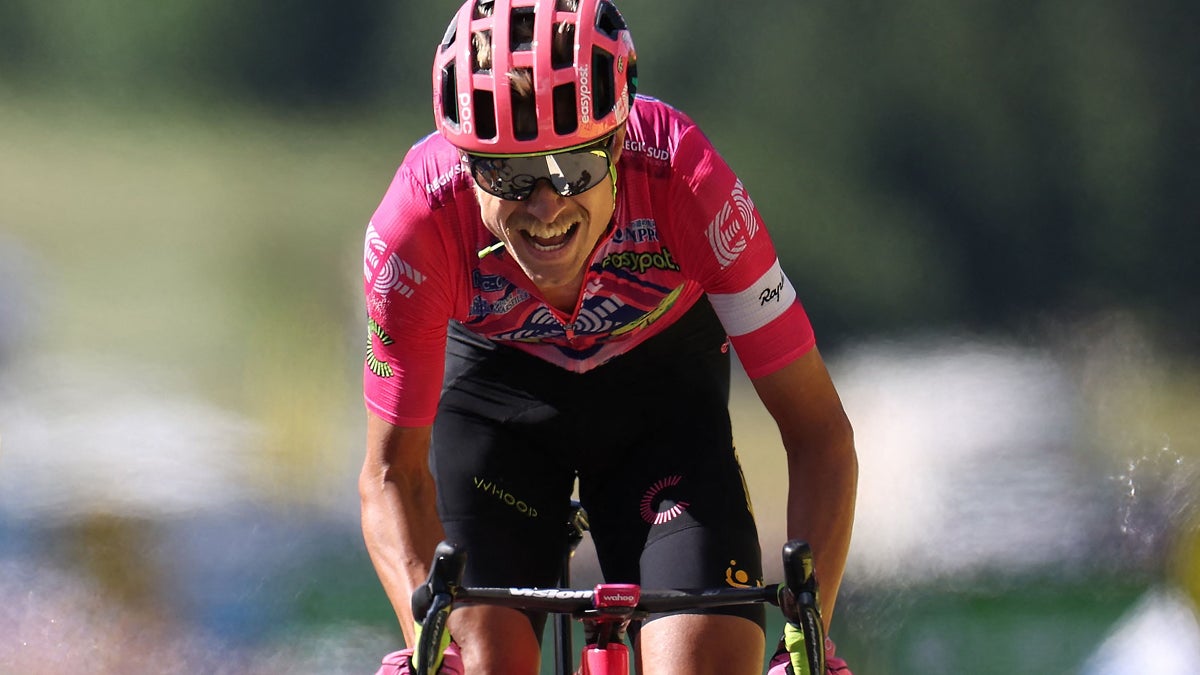No products in the cart.
Outdoor Adventure
How Does COVID Impact a Tour de France Cyclist?
Get full access to Outside Learn, our online education hub featuring in-depth fitness, nutrition, and adventure courses and more than 2,000 instructional videos when you
sign up for Outside+.
This article was first published by CyclingTips.
This Tour de France has been raced with the menacing threat of COVID-19 hanging over it. There were late substitutions right up until the Grand Départ in Copenhagen, and in the weeks since 13 riders have tested positive for the virus, including stage winners, team leaders, and vital domestiques.
One of those riders was Danish rider Magnus Cort of American team EF Education-EasyPost, one of the key animators of the early stages of the race. Cort was clearly on good form coming into the Tour de France. He attacked into breakaways for more than 300 miles in the early stages, wore the KOM jersey for most of the first week, and then won stage ten.
Then, Cort started deteriorating.
A surprisingly complete picture of Cort’s changing condition exists, both from his reported impressions in a daily column he wrote for Danish news site BT.DK, and in the form of data released from his Whoop fitness tracker.
Cort wrote on Saturday that “since Wednesday, I have had discomfort in my body,” but at that point had recorded negative results on multiple COVID tests. He wrote that he felt “lethargic,” with several other symptoms. “It has not been a fever, but it is as if many of the symptoms have overlapped the fatigue, so I cannot completely separate things,” he explained. Cort had also been struggling to get to sleep, despite his fatigue. We already know that on the night following his stage win, Cort was up late, but celebration one night turned to sleeplessness thereafter. “Fatigue has set in in my head,” Cort wrote. “I feel used. It is hard mentally to ride such a long bike race. Especially in this insane heat.”
On Sunday morning, Cort had the answer as to why he had been feeling so unwell, returning a positive COVID test after five days of symptoms. “Magnus Cort woke up this morning with a headache and fever and has since tested positive for COVID-19. He will not start stage 15 of the Tour de France. His medical evaluation is ongoing,” his team said on its social media.
On Monday, the exercise tracking company Whoop—a sponsor of EF Education-EasyPost—shared physiological data that supported Cort’s observed impressions.

The surprising metric is Cort’s recovery score, and how quickly he bounced back from one day to the next prior to contracting the virus. For the first 16 days of the race, Cort’s recovery averaged 57 percent from one day to the next. On the day of his COVID-19 positive, that dropped dramatically, to 19 percent.
His respiratory rate jumped up significantly, too, from 14.5 average breaths per minute, to 16.5.
Cort’s resting heart rate showed an even more dramatic spike. Over the five days leading up to the COVID positive, his resting heart rate slowly increased from 37 bpm, before spiking up to 47 bpm on the morning of his withdrawal from the race.
His heart rate variability also plummeted. This measure of the interaction between the parasympathetic and sympathetic nervous systems, measured in milliseconds, is, Whoop says, an important indicator of a body’s health. A low measure indicates that “your body is working hard for some other reason (maybe you’re fatigued, dehydrated, stressed, or sick and need to recover), which leaves fewer resources available to dedicate towards exercising [or] competing.” On stage 11, Cort’s range was 99 ms. By stage 14, as his body fought the burgeoning infection, it dropped to 87 ms. On stage 15, when he tested positive, it plunged to 61 ms.
The final metric shared by Whoop was related to his fever symptoms. Cort’s skin temperature was, Whoop notes, “! very elevated”, increasing by 2.0° C.
The Tour de France had its final rest day on Monday, in the baking heat of Carcassonne, where the remaining riders of the race will be resting in preparation for three days in the Pyrenees, a sprint stage, a time trial, and finally a celebratory spin down the Champs-Élysées.
By that point, hopefully, Magnus Cort and the other unlucky COVID-positive members of the peloton are feeling much better.
Source link

